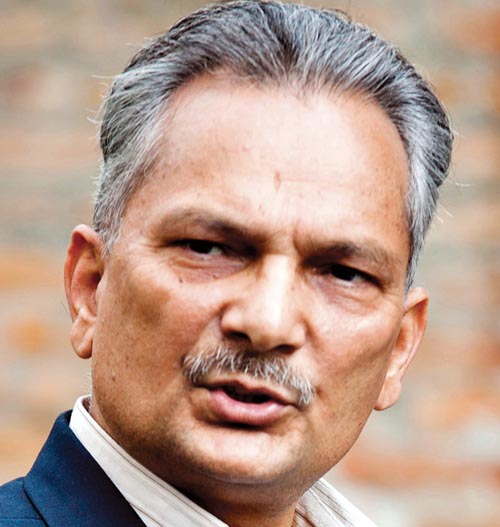Nepal Foreign Affairs (KATHMANDU, 18 March 2017) – Coordinator of Naya Shakti and Former Prime Minister Baburam Bhattai has said India was not interfering in Nepal’s internal affairs by saying Nepal’s new constitution is inconclusive. He blamed India for not supporting pro inclusive forces consequently the space is being taken by ”conservative forces”.
Speaking at a discussion at Delhi-based think tank Centre for Policy Research on Friday (17 March) Bhattarai explicitly commented on policy and deeds of India to Nepal. His explanation was in answer to a query on whether India had any role in the internal politics of Nepal.
“On specific political issues, no outside force should have a role. it is recognised as interference in internal affairs,” said Bhattarai, adding “If there is broader policy, which have regional and international ramification.. such issues among friends and neighbours there should be broader consultations… that should not be seen as interference in internal affairs.”
Bhattarai gave example of policy matters like “inclusive democracy” and “democracy versus autocratic monarchy” which have “fallout even in neighbouring country.” ”But that should not indulge in specific issue, who should be leader, who should promoted or who should be demoted, that is interference in internal affairs,” said the former Maoist leader.
Bhattari had criticised India for often involved in micro managing Nepal’s domestic affairs. “India has ended up getting involved in petty issues like appointments of government personnel, which don’t necessarily add to the Government of India’s leverage. Nepal needs to get its politics right, India needs to get its policy, priorities and approach right,” said Bhattarai.
He complained that Indian government officials and leaders did not support the pro-inclusive forces in Nepal by which he says Nepal is making a reverse gear. Bhattari observed. “For the past year and a half, India has emphasised the issue of an inclusive constitution. But if this was a priority for India, why did it not help pro inclusion forces in the first Constituent Assembly?”. He was clearly hinting that United Madhesi Democratic Front (UMDF) and his Naya Shakti party are not getting support from India.
He asserted that India seemed uninterested in getting a constitution under the Maoists. “At that point, pro inclusion forces were stronger, Maoists and Madhesis were in fact allies, I was Prime Minister and we felt that India was not very enthusiastic about seeing a constitution promulgated under the Maoists. When such forces became weak, a certain kind of constitution was pushed by regressive forces. Even then, for a long time, India did not send out a clear message,” said Bhattarai.
Indian online magazine the wire in its detail report said India’s strong message that inclusive constitution was essential came in only when the statute was being promulgated in 2015. Bhattari said “It was when the constitution was being promulgated that the Indian establishment made clear that they thought an inclusive constitution was essential. By then, counter revolutionary forces had become dominant,”.
He further said “Let us admit there is trust deficit, that it comes from our perceptions of your desire to control Nepal and your perceptions of Nepal’s unreliability on security and strategic issues. Let us also acknowledge that Nepal is making a mistake by pushing through exclusionary politics in a diverse society and India has made mistakes in the way it has approached Nepali politics,”.
Commenting on the concurrent political situation in Nepal, Bhattarai said that the right process should have been to first pass the constitution amendment and then conduct the local election, which is scheduled to be held on 14 May.
“Unfortunately, we have seen the resurgence of ultra nationalism in Nepal, which seeks to exclude Madhesis from the national mainstream internally and blames India externally. This unhealthy nationalism now has wide resonance in Nepal’s hills, among the Khas Arya segment of our population. This is blocking the path to progressive constitutional amendment,” he said.

